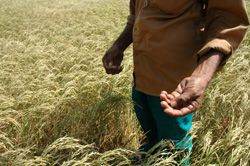|
GLOBAL:
Differing views on a “new deal” to counter soaring food
prices for the poor.
(Nairobi, April
06,
2008 Ceegaag Online)
 
With soaring food prices
expected to continue for the foreseeable future, the World
Bank is calling for a “new deal” of long-term measures,
ranging from increased investment in African agriculture to
genetically engineering fuel-producing plants.
Aid organizations are
already confronting growing financial shortfalls in their
struggle to feed the world’s hungry as food prices have
exploded over the past six months, propelled by increased
demand from newly prosperous Asian countries like China,
rising fuel prices and the diversion of land from food crops
to bio-fuel production.
The problem extends way
beyond usual temporary production blips like the recent
Australian drought, the volatility of soaring oil prices and
a falling dollar, and could be severely compounded by
climate change - with harsher droughts in some parts of the
world and more severe flooding in others predicted.
In a worst case scenario
not only could mortality and disease from malnutrition,
already the underlying cause of an estimated 3.5 million
child deaths each year, soar, but widespread social and
political unrest might erupt. Food riots have already been
reported in several countries and the World Bank estimates
that 33 nations face potential social unrest.
“For these countries, where
food comprises from half to three-quarters of consumption
[spending], there is no margin for survival,” World Bank
President Robert B. Zoellick told the Center for Global
Development in Washington on 2 April, calling for a “new
deal” combining hundreds of millions of additional dollars
for immediate relief with long-term efforts to boost
agricultural productivity in developing countries.
He announced that the Bank
would nearly double agricultural assistance to US$800
million in Africa, adding: “We can help create a ‘Green
Revolution’ for sub-Saharan Africa.”
Just last month the UN
World Food Program (WFP) issued an “extraordinary emergency
appeal” to world government leaders, endorsed by Zoellick
yesterday, for an additional $500 million over the $2.9
billion it sought a few months ago, just to feed the same 73
million people in 78 countries.
Policy questions
For some the World Bank’s
“new deal,” which follows up on the conclusions of a report
last year, has been too slow in coming. “The World Bank, I
would say very belatedly, acknowledged the importance of the
agricultural sector,” Tom Arnold, chief executive of the
non-governmental organization (NGO) Concern Worldwide, which
seeks to reduce suffering in the poorest countries, told
IRIN.
“Immediately, there needs
to be a recognition that if we are to have some kind of
international safety net in place for the most vulnerable
people on the planet, then responding positively to
something like WFP is an important aspect,” he said.
“For the longer term, there
are a lot of big policy questions that need to be addressed
both nationally and internationally, such as taking
agriculture more seriously in the economic sector... Any
short-term measures to alleviate the problem have to go hand
in hand with a serious and strategic commitment to promoting
agricultural productivity in sub-Saharan Africa.”
Other NGOs agree. “For the
recent couple of decades donors, including countries like
the United States, have been quite dramatically neglecting
the agricultural sector, reducing their funding support for
agricultural programs,” Oxfam America Policy Director Gawain
Kripke told IRIN.
“The food aid system is
quite broken and needs reform, and urgently needs it,
because dollars are being wasted quite dramatically. We need
to be thinking about less short-term palliative responses
and longer-term security responses,” he said.
Avoiding high
transport costs
The NGO Action against
Hunger (AAH) calls for building capacity in Africa through
access to credit, agricultural extension programs and
training, citing the continent’s untapped potential and the
need to avoid the high transportation costs as oil prices
soar.
“The transport costs
associated with food aid could be better used to improve
local production techniques and agricultural systems,” AAH
Food Security Adviser Silke Pietzsch told IRIN.
Oxfam America’s Kripke
cited US insistence that all US food aid be purchased in the
US and shipped mostly on US-flagged carriers as a major
barrier, greatly increasing costs and entailing delays of up
to six months.
“The cost increment of
doing it that way rather than buying food more flexibly for
instance in Africa for distribution in Africa, can be 50
percent,” he said. “So we can get a lot more assistance from
the same amount of money if the United States were to reform
how it did its food assistance.”
GM crops
Siwa Msangi, research
fellow in the Environment and Production Technology Division
of the Washington-based International Food Policy Research
Institute (IFPRI), believes bio-technology holds the
solution and that genetically mutated crops need to be
de-demonized.
“Biotechnologies can help
us grow more drought-resistant, pest-resistant,
disease-resistant traits in staple crops,” he told IRIN.
This could counter climate change by, for example, producing
submergence-resistant strains to withstand increased
flooding.
“There are certain
attitudes to technologies in food that I think we need to
overcome through better education,” he said, citing the
prejudices against so-called franken-foods and franken-fish
and noting that farmers in Africa are afraid to use
bio-technologies that might reduce their competitiveness on
the European market due to attitudes there.
But for some there is at
present no clear way ahead. Jim Bishop, president for
Humanitarian Policy and Practice of inter Action, a US-based
coalition of non-profit organizations, said US groups and
international agencies like the WFP are still trying “to
come to grips” with how to respond adequately.
“The longer term prospects
are not terribly encouraging,” he told IRIN. “No one has
come up with an agreed answer to the problem. There
obviously isn’t a silver bullet, and there’ll be various
views, and we hope that the international community will
contribute additional resources.”
Bio-fuels and
biotechnology
Nobel economics prize
winner and former World Bank chief economist Joseph E.
Stiglitz sees bio-fuels as a major culprit. “The market has
been distorted badly by some of the bio-fuel requirements,”
he told IRIN. “The whole system is affected by this very
large withdrawal of agricultural output that was going into
food production.”
But this is where
biotechnology could come to the rescue, according IFPRI’s
Msangi. “We should be aiming for high yielding varieties
both for food and for fuel as well,” he said, foreseeing a
switch to grasses, and to using the stock instead of the
grain of maize for fuel.
Meanwhile the immediate
problem remains. Zoellick called for immediate action on
WFP’s new appeal. “The United States, the European Union,
Japan, and other OECD [the 30-member Organization for
Economic Co-operation and Development] countries must act
now to fill this gap - or many more people will suffer and
starve,” he warned.
USAID
announced in February that its food aid costs had jumped 41
percent in the first half of the US 2008 financial year,
swallowing $120 million.
Another donor, the Canadian
International Development Agency (CIDA), this fiscal year
has already provided over $116 million to WFP. “The
Government of Canada is concerned by the impact that the
rising price of food commodities will have on the world’s
vulnerable and hungry people,” CIDA spokeswoman Jo-Ann
Purcell told IRIN. “We will continue to follow WFP needs
closely and make every effort possible to respond to the
increased demands for food aid.”
WFP continues to call
attention to the plight of the one billion people who still
live on less than $1 a day, the threshold defined by the
international community as absolute poverty, below which
survival is in question.
“The crunch means that
families which may have had a bit of money to pay school
fees for their children, to go to clinics when they are
sick, or take much-needed nourishing food together with
anti-retroviral drugs, will suffer as they will cut back in
these areas,” it said in a recent update. “They will also
start cutting meals and substituting less nutritious foods.”
Source: Irin News

webmaster@ceegaag.com |

